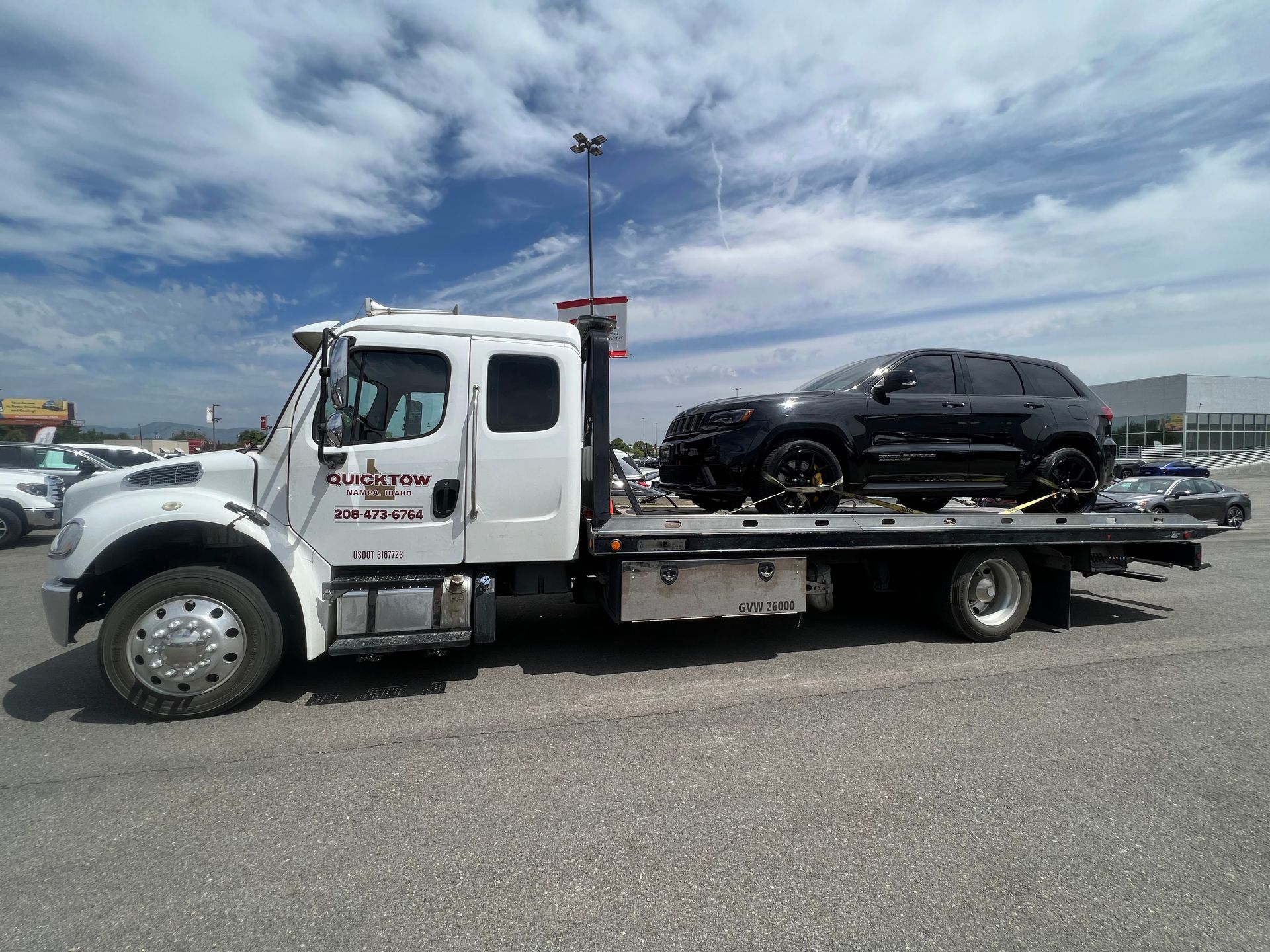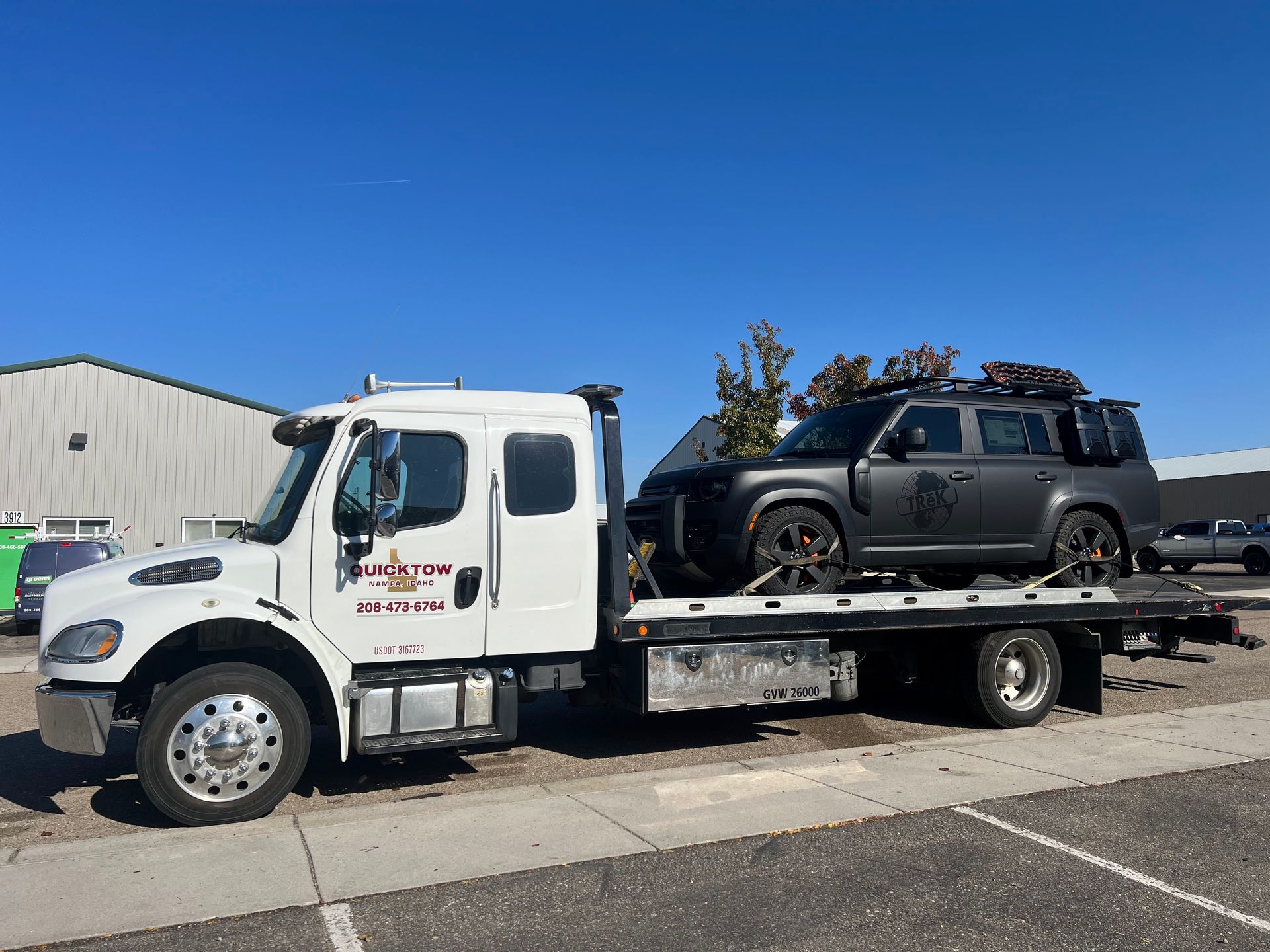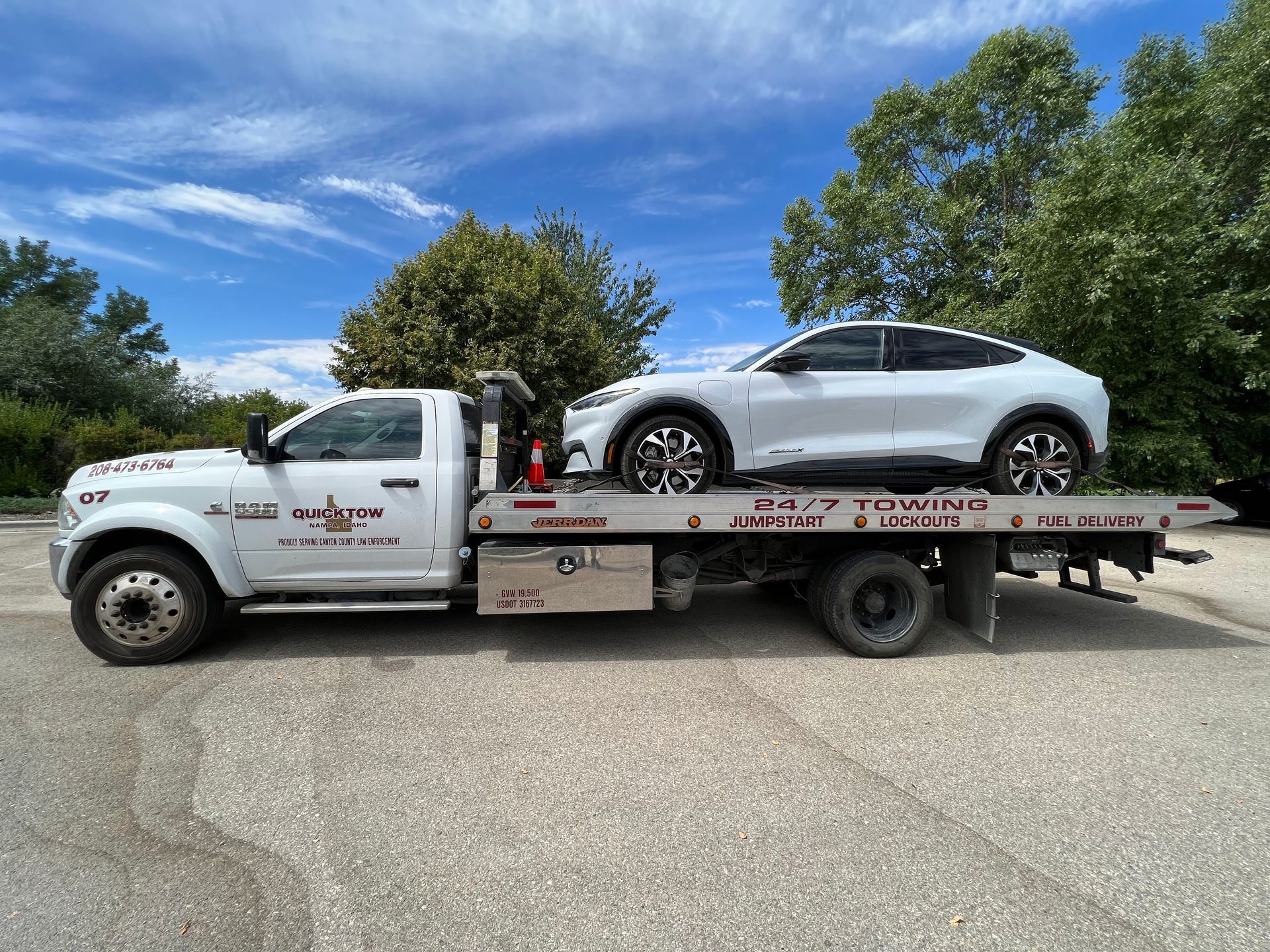How Much Does It Cost To Tow A Car? The Towing Cost Guide
Whether it happens at 5 a.m. when the sun is rising or 5 p.m. when traffic is getting heavy, a breakdown is never convenient. Even if the thought never crossed your mind before, you may be wondering now, “How much does it cost to tow a car?”
Towing services play a vital role in our daily lives, rescuing stranded motorists from breakdowns and offering a lifeline when things go wrong. Like any professional service, there are costs associated with the convenience and expertise they provide. Understanding the factors that influence the price of towing can help you anticipate expenses, make informed decisions, and prevent financial surprises down the road.
In this post, we’ll break down the average cost of towing a car, the average cost per mile, and the various factors that go into pricing. Here’s everything you need to know about tow truck costs in case you find yourself stranded with a car that won’t start or stuck in the ditch on the side of the road.
If you're in the Boise area and you need a tow, planned or unplanned, we serve the entire Treasure Valley from Boise to
Meridian, Nampa, Caldwell, Middleton, Kuna, and more. We're available 24 hours a day, 7 days a week. Give us a call or click the button below to get more information.
Tow Truck Costs
According to J.D. Power, the average cost in the US to tow a car is $109. However, this number will vary depending on a number of circumstances. The type of tow needed, the time of day, the distance, and the condition of the vehicle can all affect tow truck costs.
Other costs that come with getting your car towed may include:
- Extra services, such as refueling or roadside assistance
- Specialized equipment needed
- Use of a winch if your car is stuck in snow, mud, or another difficult to retrieve area
How Much Does It Cost to Tow 5 Miles?
How much does it cost to tow a car 5 miles? The cost of towing a vehicle for a 5-mile distance will depend on a number of factors, including the region, towing company, and additional services required. Most towing companies start with a base towing fee and then charge a certain amount per mile. As a rough estimate, the towing fees average between $2.5 per mile to $7 per mile.
The shorter the distance your vehicle needs to go, the less you can expect to pay for your tow. For example, the average cost to tow a car 5 miles or less is $80, but can range between $35 and $125.
How Much Does It Cost to Tow a Car 10 Miles?
How much does it cost to tow a car 10 miles? The cost to tow a car 10 miles will vary, but the average cost is $95 for towing services over 5 miles. Towing a car a distance of up to 40 miles will cost typically somewhere between $125 and $275. Towing a car up to 100 miles usually costs between $275 and $600.
Average Towing Cost Per Mile
One of the most crucial aspects of calculating towing costs is the distance to be covered. Towing companies often use a per-mile pricing structure to determine the overall expense of transporting your vehicle to its destination. According to J.D. Power, the average towing cost per mile is $4.75, but you can expect to pay between $2.50 and $7 per mile when getting your vehicle towed.
Distance plays a significant role in towing costs as it directly impacts the time, fuel, and resources required to complete the job. Generally, the longer the distance, the higher the overall cost. This is because towing companies factor in the wear and tear on their vehicles, fuel expenses, and time spent on the road when calculating their prices.
How Towing Costs Are Calculated
Tow truck costs are usually calculated based on several factors that influence the complexity and number of resources required for the towing service. First of all, most towing companies will charge an initial towing fee with an added cost per mile. While each tow company has its own pricing structures, here are some common factors that can contributed to the tow truck costs:
- Distance: The distance between the location of the tow truck and the pickup point of your vehicle is a pretty big factor in determining the cost. Longer distances usually result in higher towing fees since they take more time, resources, and fuel.
- Type of tow: The type of tow needed can also affect the cost. For example, a simple flatbed tow truck is probably fine for a standard car, while a heavy-duty tow truck might be necessary for larger vehicles like RVs or commercial trucks. Any unique circumstance that requires special equipment or additional personnel can also lead to higher costs.
- Location: Towing costs can vary based on the area or region where the service is provided. Urban areas with higher operating costs, such as in a densely populated city, may have higher fees compared to rural areas.
- Additional services: If you need any additional services beyond basic towing, such as winching, recovery from difficult terrain, or unlocking a locked vehicle, these services may incur extra charges.
- Time of day: Towing services requested during non-business hours, weekends, or holidays often come with higher rates due to increased demand and less availability. For example, there will be fewer tow truck drivers working at two a.m. on a Saturday than at 10 a.m. on a Monday.
- Storage fees: In cases where your vehicle needs to be stored at the towing company’s facility before you can retrieve it, you may have to pay a daily storage fee. These fees vary depending on the duration of storage.
Towing fees can vary significantly depending on the specific circumstances of your breakdown as well as the policies of the towing company you choose. It’s always a good idea to contact different towing companies and request a quote to get a more accurate estimate of the costs. Some cities set a max towing fee that companies cannot charge above, and if your fees seem too high, you can look into your city or state’s laws.
Does Insurance Cover Towing?
The answer to this question really depends on your specific insurance policy. Many full-coverage insurance policies don’t include towing, but there may still be ways to get the cost of towing your car covered. For example, your policy may have a roadside assistance package or an optional add-on to purchase separately.
If your policy includes towing coverage, it typically covers a certain number of miles or a specific dollar amount towards towing expenses. Your insurance may require you to use specific towing companies or have pre-approved providers for the coverage to be valid. It’s important to know these details so you can follow the appropriate procedures should you need your car towed.
If your insurance policy does not include towing coverage, you may still have options available. For example, a third-party roadside assistance program like AAA usually costs between $5 to $10 a month and often includes towing, battery jump start, lockout service, and more.
Some policies allow you to submit a claim for reimbursement after you’ve already paid the towing fees. Keep in mind that they may not reimburse you for the full amount. For example, some policies may only reimburse you for $50, even though the average towing cost is $109. If you were involved in an accident, your insurance or the at-fault driver’s insurance may cover the cost of towing in addition to the cost of repairs.
Types of Tow Trucks
There are several different types of tow trucks, each designed for specific towing needs and vehicle types. If you have a standard sized vehicle, you’ll probably be okay using a flatbed tow truck. Flatbed tow trucks typically come with the least expensive tow truck fees. However, for vehicles such as a motorcycle or semi-truck, you’ll need a specialty tow truck, which can cost you more.
Here are some common types of tow trucks:
- Flatbed tow trucks: Flatbed tow trucks feature a large, flat platform or bed at the back that can be hydraulically inclined or lowered to the ground. Your vehicle that needs to be towed is loaded onto the flatbed, which is then raised and secured for transportation. Flatbed tow trucks can support a wide range of vehicles, such as cars, SUVs, and even some heavy machinery.
- Wheel lift tow trucks: Wheel lift tow trucks use a metal yoke or frame with hydraulically operated arms to lift the front or rear wheels of the vehicle off the ground. Your vehicle is towed with its remaining wheels rolling on the road. This type of two truck is often used for smaller vehicles and can be more maneuverable than a flatbed. Wheel lift tow trucks can be a more economical option than flatbed tow trucks, but only work for some vehicles.
- Hook and chain tow trucks: Hook and chain tow trucks were used more commonly in the past but have become less popular. They employ chains or straps that are wrapped around the axle or frame of the towed vehicle, which can sometimes cause cosmetic or mechanical damage. Because these tow trucks can potentially damage your vehicle, hook and chain tow trucks are usually reserved for totaled cars.
- Heavy-duty tow trucks: Heavy-duty tow trucks are designed to handle large and heavy vehicles, like semi-trucks, buses, or RVs. These trucks have powerful engines, strong towing capacities, and specialized equipment like boom lifts or winches to handle the weight and size of the vehicles they tow. You can expect to pay more for a heavy-duty tow than you would for a standard vehicle. For example, getting your semi-truck towed could cost you up to $1700 or more.
- Motorcycle tow trucks: Motorcycle tow trucks are specialized vehicles designed for safe and secure towing of motorcycles. They feature motorcycle-specific designs with low ground clearance for easy loading and unloading, secure mounting systems, multiple tie-down points, and protection to prevent scratches. While flatbed tow trucks can accommodate motorcycles, motorcycle tow trucks come with specialized equipment to ensure optimal results.
Towing Cost Summary
So how much does it cost to tow a car? That depends on a number of factors, including the time of day, the type of vehicle, the condition of the vehicle, and the distance to be towed. The average cost to tow a car is $109, but your specific towing fees will vary depending on the specifics of your breakdown.
If you’ve been in a car accident, your insurance or the at-fault party’s insurance will likely cover your towing fees. But if your car simply breaks down, you may have to rely on a third-party insurance like AAA or pay out of pocket.
If you break down in the Treasure Valley, you can count on QuickTow and Recovery to be there, no matter the time of day. We’re a family-owned company that offers 24/7 towing and roadside assistance from Boise to Middleton. We do lockouts,
jump starts, roadside assistance, and obviously towing.





